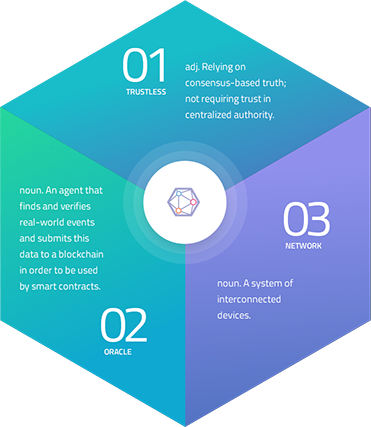XYO Network - Implementing the Proof of Location Concept
There is an interesting component in the Ethereum architecture we've never discussed before. Let's talk about so-called "Oracles" - agents, providing the link between Ethereum Smart Contracts and the outside world. In other words, Oracles are responsible for supplying Smart Contracts with the external data, necessary for making decisions. Also, it's the weakest link in the whole architecture. Because while everything that's going on on blockchain and inside Smart Contracts is protected by the intrinsic reliability of its architecture, any external information isn't that tamper-proof. In other words, the malicious players, posing as Oracles, can easily feed false data to the Smart Contracts. Or this external data and its sources might be dubious in the first place. Designing trustworthy Oracle schemes is actually one of the key problems of the Ethereum projects developers face at the moment.
The problem of trustworthiness of external data is particularly relevant in the context of the "Proof-of-Location" concept. The term emerged in the Ethereum community in 2016, and the main idea was formulated like that: We routinely publicize our locations via our GPS equipped devices. Apart from Facebook posts, geo-location tracking can actually be a useful tool for businesses and commerce. One of the good examples of GPS tracking application can be in the delivery services, where it can ensure that the respective packages are successfully delivered, or provide the client with the reliable information about his order’s current whereabouts. Another possible application is geo-tagging of the product and place reviews, as well as any other marketing related comments. For example, I can write a customer first-hand experience based review of some restaurant in Dubai where I've never been because I've never been in Dubai in the first place. Which of course is a shady marketing practice, although, fake reviews and comments are ubiquitous. On the other hand, a requirement to supply such reviews with verifiable geo-location information can prevent this proliferation of first-hand experience reviews, written by people who never had that first-hand experience, not even close.

So, GPS tracking can be considered valuable information regarding business logistics, but here we bump into another problem. GPS data is very easy to spoof. In other words, for example, location data attached to somebody's Facebook post, sent from her smartphone, might easily not at all reflect the current state of affairs. It's more critical for businesses; it's an issue of trust. If I know how easily location data can be forged, any references to location data given to me, regarding deliveries, facility locations, etc. won't mean much to me. I know that those GPS coordinates could've been simply conjured using the power of company marketing team's wishful thinking.
So, considering this situation, we come to a realization that we need some more trustworthy evidence of person's/item's geolocation. Well, if we want to be able to take this information seriously. Which leads us to the XYO Network project. The project proposes a number of mechanisms, allowing to supplement geo-location data with information, confirming its correctness. In other words, XYO Network offers a technical solution for Proof of Location problem. The company’s ultimate ambition is to organize a global decentralized database of verified geo-location information that can be later used for aforementioned commercial purposes.
Speaking of proposed methods to tackle the problem of reliability of GPS data. One of the proposed approaches is so-called "Bound Witness." As an analogy, I can bring the situation when I travel somewhere with some friend of mine, and each of us independently posts photos of us together, supplying them with geo-location coordinates. People see that we are together on the photos, and that our GPS coordinates, sent independently from different devices, coincide. This way, location information is more reliable because it's less likely that we have simultaneously tweaked our smartphones to post false information. This idea, applied on a grander scale, allows to create a network of GPS tracking devices, constantly controlling each other and confirming the validity of each other's data. In this setup, GPS information, supplied by such system, can be considered trustworthy because it's confirmed by a group of independent witnesses.
Another technical concept, proposed by XYO Network, is called "Proof-of-Origin Chain". Without getting deep into technical details, the main idea is that, regarding mobile GPS tracking devices, their private keys and signatures, created with those private keys, cannot provide a reliable proof of the validity of the information they send. The problem is that the private keys of such devices can be easily stolen. Therefore the better approach in this situation is to use temporary key pairs, generated for each transaction. After transaction is completed, the keys, used to sign it, are destroyed. This reduces the risk of private keys getting into hands of malicious actors. As a result, this approach to data validation and transmission gives more guarantees that information isn't tampered with and trustworthy.
The XYO Network platform architecture includes the next components:
- Sentinels - Using project's terminology, they play the role of "Location Witnesses." They observe and control all the geo-location data, coming to the system, and confirm its correctness.
- Bridges - the components, gathering information transmitted by Sentinels and transferring it to Archivists. The Bridges seal the received information with additional signatures. Altogether with initial signatures, this set of information comprises the "Proof of Origin."
- Archivists - the components, accumulating and storing all the incoming GPS information. Archivists receive data from Bridges and store it indefinitely, retrieving it when they need to fulfill the requests of Diviners.
- Diviners - well, this is the main system’s component. Diviners provide the link between the geo-location data consumers and data archive. They receive and process users' requests, retrieving and delivering relevant geo-location information in response.
Generally, in comparison with other project working on the "Proof of Location" problem, the concepts and technical ideas of XYO Network sound technically viable and thought through.

Token Distribution
From March 20, 2018, until May 20, 2018, XYO Network will conduct a public token sale. The sale has a tiered pricing structure that starts at 1 ETH: 100,000 XYO and maxes out at 1 ETH: 33,333 XYO.
[embed]



This is my @originalworks
This post has received a 0.03 % upvote from @drotto thanks to: @cryptotaofficial.
Congratulations @cryptotaofficial! You have completed some achievement on Steemit and have been rewarded with new badge(s) :
Click on any badge to view your own Board of Honor on SteemitBoard.
For more information about SteemitBoard, click here
If you no longer want to receive notifications, reply to this comment with the word
STOP